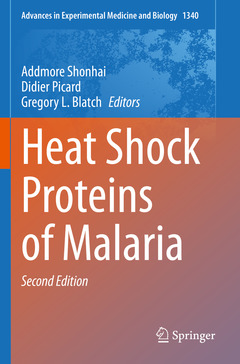Heat Shock Proteins of Malaria (2nd Ed., 2nd ed. 2021) Advances in Experimental Medicine and Biology Series, Vol. 1340
Coordonnateurs : Shonhai Addmore, Picard Didier, Blatch Gregory L.

Chapter 1. Introductory Chapter: The Importance of Heat Shock Proteins in Survival and Pathogenesis of the Malaria Parasite Plasmodium falciparum.- Chapter 2. General Structural and Functional Features of Molecular Chaperones.- Chapter 3. The Role of Hsp70s in the Development and Pathogenicity of Plasmodium falciparum.- Chapter 4. Role of the J Domain Protein Family in the Survival and Pathogenesis of Plasmodium falciparum. Chapter 5. Role of Hsp90 in Plasmodium falciparum Malaria.- Chapter 6. The Role of Malaria Parasite Heat Shock Proteins in Protein Trafficking and Remodelling of Red Blood Cells.- Chapter 7. Role of Heat Shock Proteins in Immune Modulation in Malaria.- Chapter 8. Bioprospecting for Novel Heat Shock Protein Modulators: The New Frontier for Antimalarial Drug Discovery?.- Chapter 9. Heat Shock Proteins as Targets for Novel Antimalarial Drug Discovery.- Chapter 10.- Heat Shock Proteins of Malaria: Highlights and Future Prospects.
Addmore Shonhai is a full Professor in Protein Biochemistry and head of the department of Biochemistry at the University of Venda, South Africa. His research focuses on understanding the role of heat shock proteins in parasite cyto-protection and virulence. He is particularly interested in studying the structure-function features of heat shock proteins that are responsible for their unique roles in various organisms despite their apparent sequence conservation. He is a recipient of a prestigious Georg Foster Research Fellowship awarded by the Alexander von Humboldt (AvH) of Germany and is a life-time member of the AvH fellowship program. His research has been primarily funded by the Germany Research Foundation (DFG) and National Research Foundation of South Africa. His passion is to train student scientists from disadvantaged background. In addition, he is interested in sharing his skills with collaborators from around the world but is especially interested in promoting science in Africa. To this end, he has conducted several workshops on protein biochemistry and molecular biology held at various institutions such as Babcock University, Obafemi Awolowo University, Nigeria Institute of Medical Research, and the University of Zimbabwe Medical School.
Didier Picard is a cellular and molecular biologist with almost 40 years of experience in basic research in academia. He obtained his PhD from the University of Zurich, Switzerland. Following a postdoc at the University of California in San Francisco, California, he became a full professor at the Department of Cell Biology at the University of Geneva, Switzerland. He has served as departmental chair and president of biology at the University of Geneva. His research interests include molecular chaperones (in vivo functions of Hsp90 and its cofactors) and steroid receptors (mechanisms of transcriptional activation of the estrogen receptor a, signaling crosstalk, antiestrogen resistance of brea
Date de parution : 09-2022
Ouvrage de 251 p.
15.5x23.5 cm
Date de parution : 09-2021
Ouvrage de 251 p.
15.5x23.5 cm



